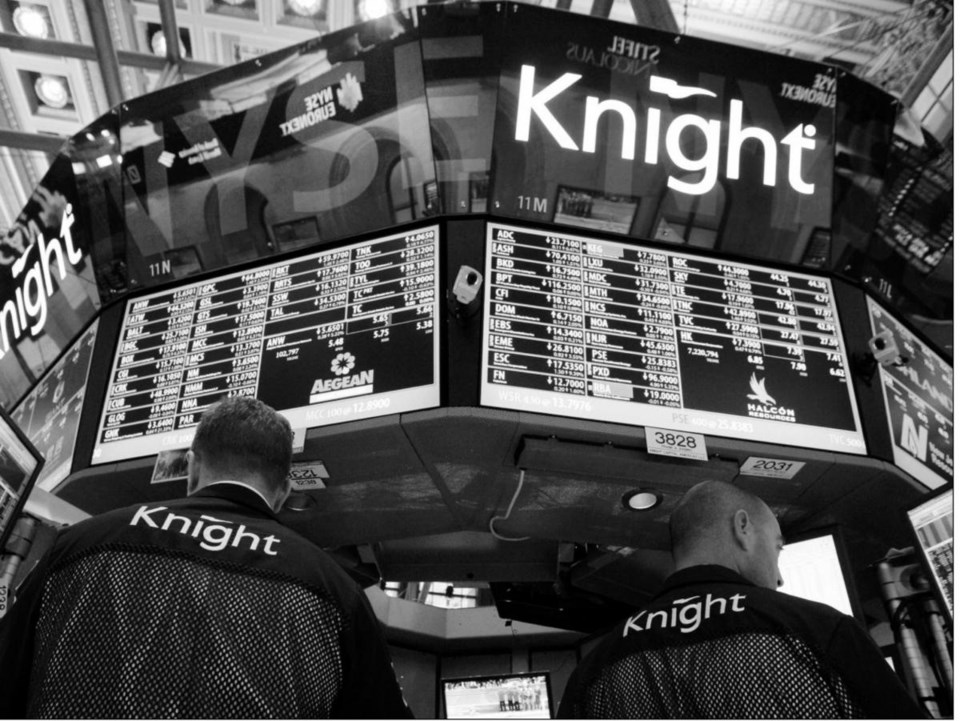Knight Capital Group, the trading firm responsible for last week's stock market mayhem, avoided collapse by lining up a $400 million lifeline from a group of other Wall Street companies on Monday.
But the money comes at a steep price.
Knight says it will get the cash infusion from an investor group led by Jefferies Group, as well as Blackstone, Getco, Stephens, Stifel Nicolaus and TD Ameritrade. In exchange, the group will receive stock that can be converted to a 73 per cent stake in Knight, which means Knight is essentially handing over control to the investor group. Knight will also add three directors to its board.
Knight's stock has mostly been in free-fall since a massive computer error in its systems last Wednesday sent huge numbers of erroneous orders flooding into the market, causing dozens of stocks to swing wildly in heavy volume. Knight said the foulup would cost the firm $440 million as it paid for stock positions it mistakenly bought.
Knight's CEO Thomas Joyce, speaking in an interview on CNBC, said that only Knight, and not its clients, were hurt by Wednesday's snafu.
"This was an isolated situation," Joyce said. "We screwed up. We paid the price."
Joyce said his firm was still doing a post-mortem on the technical blunder and still didn't have a full understanding of what went wrong. He characterized the error as a "large" but "simple" breakdown on trading technology.
Knight Capital, based in Jersey City, New Jersey, is a trading firm that takes orders from big brokers like TD Ameritrade and E-Trade. It then routes them to the exchanges where stocks are traded, like the New York Stock Exchange.
Even with the cash infusion, it's not yet clear that Knight will regain the trust of other key players in the stock market to carry on and survive as a firm. Last week some of Knight's trading partners said they would suspend routing trades through them until the situation settles.
One of the roles Knight plays in the stock market is that of a "designated market maker." Those firms are responsible for keeping trading of the stocks they oversee orderly. They are viewed as particularly important during the open and close of trading, as well as during times when there is a lot of volatility in the market.
Ten minutes before stock trading opened Monday morning, the New York Stock Exchange issued a press release saying it was temporarily reassigning Knight's responsibilities of trading 524 NYSE-listed stocks to Getco, a rival firm and also one of Knight's new owners.
Knight's blunder has been a disaster for the firm's current investors. The value of the company's stock is now down 70 per cent from Tuesday, the day before the blunder occurred. By issuing more shares, the value of what's held by current investors is diluted among more shareholders. It also means the company's earnings are spread among a greater number of shares.
The investor group will receive 267 million shares to convert to common stock for $1.50 a share. The firm currently has about 98 million outstanding shares, according to FactSet.
The Securities and Exchange Commission refused to provide an exemption so it wouldn't have to buy back so many of the mistaken trades.
The SEC allows trading firms to cancel some erroneous trades, but it has gotten stricter about what qualifies ever since the notorious "flash crash" of May 2010, when another technical problem sent the Dow Jones industrial average plunging nearly 600 points in five minutes.
The trading disaster Knight caused has revived a thorny debate in the financial system about the merits of high-speed trading, where lightning-fast mathematical algorithms trade stocks in milliseconds and, as recent mistakes indicates, strain the system that is supposed to handle them.
More and more stock trading is handled by computers, and many market players have called for stricter controls to prevent disasters from happening.



